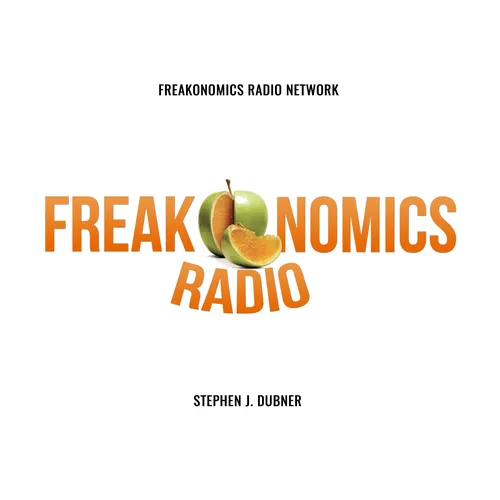
Freakonomics Radio
Freakonomics co-author Stephen J. Dubner uncovers the hidden side of everything. Why is it safer to fly in an airplane than drive a car? How do we decide whom to marry? Why is the media so full of bad news? Also: things you never knew you wanted to know about wolves, bananas, pollution, search engines, and the quirks of human behavior.
To get every show in the Freakonomics Radio Network without ads and a monthly bonus episode of Freakonomics Radio, start a free trial for SiriusXM Podcasts+ on Apple Podcasts or by visiting siriusxm.com/podcastsplus.
- Update frequency
- every 5 days
- Average duration
- 41 minutes
- Episodes
- 857
- Years Active
- 2010 - 2025

284. Is Income Inequality Inevitable? (Earth 2.0 Series)
In pursuit of a more perfect economy, we discuss the future of work; the toxic remnants of colonization; and whether giving everyone a basic income would be genius -- or maybe the worst idea ever.

283. What Would Our Economy Look Like? (Earth 2.0 Series)
If we could reboot the planet and create new systems and institutions from scratch, would they be any better than what we've blundered our way into through trial and error? This is the first of a ser…

282. Could Solving This One Problem Solve All the Others?
The biggest problem with humanity is humans themselves. Too often, we make choices — what we eat, how we spend our money and time — that undermine our well-being. An all-star team of academic researc…

281. Big Returns from Thinking Small
By day, two leaders of Britain's famous Nudge Unit use behavioral tricks to make better government policy. By night, they repurpose those tricks to improve their personal lives. They want to help you…

280. “Tell Me Something I Don’t Know” on the topic of Collections.
Hear live journalism wrapped in a game show package and hosted by Stephen J. Dubner. In this episode, Tim Ferriss, Eugene Mirman and Anne Pasternak are panelists. The self-help guru, the comedian and…

How Safe Is Your Job? (Rebroadcast)
Economists preach the gospel of "creative destruction," whereby new industries -- and jobs -- replace the old ones. But has creative destruction become too destructive?

279. Why Is My Life So Hard?
Most of us feel we face more headwinds and obstacles than everyone else — which breeds resentment. We also undervalue the tailwinds that help us — which leaves us ungrateful and unhappy. How can we a…

278. Chuck E. Cheese’s: Where a Kid Can Learn Price Theory
The pizza-and-gaming emporium prides itself on affordability, which means its arcade games are really cheap to play. Does that lead to kids hogging the best games — and parents starting those infamou…

277. The Taboo Trifecta
The serial entrepreneur Miki Agrawal loves to talk about the bodily functions that make most people flinch. That's why she's building a business around the three P's: periods, pee, and poop.

276. No Hollywood Ending for the Visual-Effects Industry
In their chase for a global audience, American movie studios spend billions to make their films look amazing. But almost none of those dollars stay in America. What would it take to bring those jobs …

275. Professor Hendryx vs. Big Coal
What happens when a public-health researcher deep in coal country argues that mountaintop mining endangers the entire community? Hint: it doesn't go very well.

How to Get More Grit in Your Life
The psychologist Angela Duckworth argues that a person's level of stick-to-itiveness is directly related to their level of success. No big surprise there. But grit, she says, isn't something you're b…

274. An Egghead’s Guide to the Super Bowl
We assembled a panel of smart dudes -- a two-time Super Bowl champ; a couple of NFL linemen, including one who's getting a math Ph.D. at MIT; and our resident economist -- to tell you what to watch f…

273. Did China Eat America’s Jobs?
For years, economists promised that global free trade would be mostly win-win. Now they admit the pace of change has been "traumatic." This has already led to a political insurrection -- so what's ne…

Is the American Dream Really Dead?
Just a few decades ago, more than 90 percent of 30-year-olds earned more than their parents had earned at the same age. Now it's only about 50 percent. What happened -- and what can be done about it?

272. Trevor Noah Has a Lot to Say
The Daily Show host grew up as a poor, mixed-race South African kid going to three churches every Sunday. So he has a sui generis view of America — especially on race, politics, and religion — and he…

271. The Men Who Started a Thinking Revolution
Starting in the late 1960s, the Israeli psychologists Amos Tversky and Danny Kahneman began to redefine how the human mind actually works. Michael Lewis's new book The Undoing Project explains how th…

How to Become Great at Just About Anything (Rebroadcast)
What if the thing we call "talent" is grotesquely overrated? And what if deliberate practice is the secret to excellence? Those are the claims of the research psychologist Anders Ericsson, who has be…

How to Be More Productive (Rebroadcast)
In this busy time of year, we could all use some tips on how to get more done in less time. First, however, a warning: there's a big difference between being busy and being productive.

270. Bad Medicine, Part 3: Death by Diagnosis
By some estimates, medical error is the third-leading cause of death in the U.S. How can that be? And what's to be done? Our third and final episode in this series offers some encouraging answers.